那些和形容词同形的副词
形容词和副词
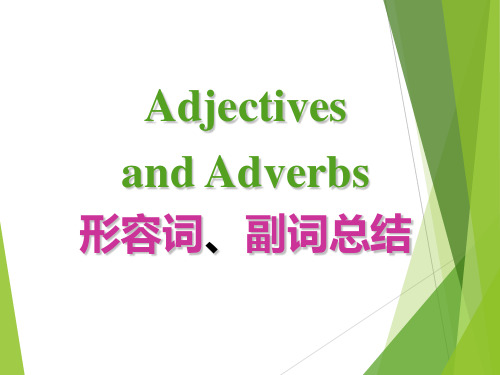
Good —— well
好
好地(当表示身体好时,是形容词)
四、功能
口诀:形名、副动、系形
1、形容词修饰名词,作定语,放前面。A prettruns quickly. 3、系动词+形容词
系动词
五、常考形容词
1、enough 足够两面派: Enough+名词 见到名词跑前面 enough money 形/副+enough 见到形/副躲后面 rich money 2、 alone独自的/地 live alone
( 3 ) too….to 太…而不能 too+形容词+to+动词原形 She is too fat to walk.
七、比较级 1、标志词
than(比….)
两者相比较
2、比较级的类型
递增比较:A+动词+比较级+than+B 递减比较:A+动词+less+原形+than+B 同级比较:(肯定)A+动词+as +原形+as+B
Hainan is a most beautiful city.
九、比较级、最高级的变化规则(单、双、多、特)
单音节:1、一般情况下+er/est. Fast-faster/fastest 2、以不发e结尾,+r/st. Nice-nicer/ nicest
双音节:3、以辅音字母+y结尾,将y变i+er / est. pretty-prettier/ prettiest, easy-easier. 4、以辅元辅且重读结尾,双写尾字母+er / est. hot-hotter / hottest, fat-fatter / fattest
形容词副词的比较级和最高级与用法
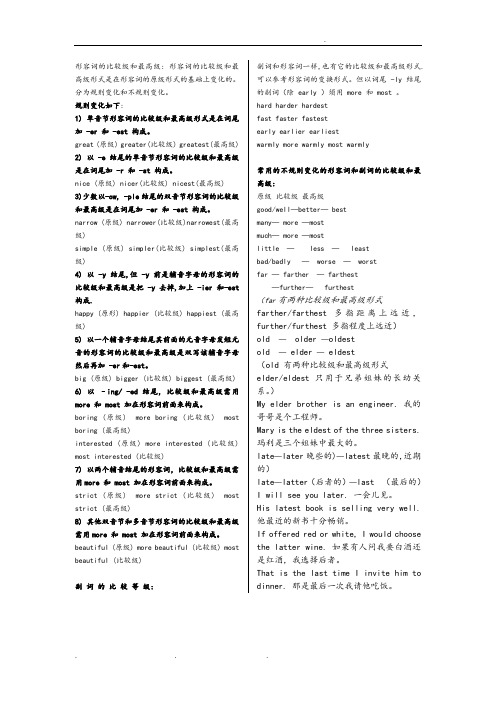
形容词的比较级和最高级: 形容词的比较级和最高级形式是在形容词的原级形式的基础上变化的。
分为规则变化和不规则变化。
规则变化如下:1) 单音节形容词的比较级和最高级形式是在词尾加 -er 和 -est 构成。
great (原级) greater(比较级) greatest(最高级) 2) 以 -e 结尾的单音节形容词的比较级和最高级是在词尾加 -r 和 -st 构成。
nice (原级) nicer(比较级) nicest(最高级)3)少数以-ow, -ple结尾的双音节形容词的比较级和最高级是在词尾加 -er 和 -est 构成。
narrow (原级) narrower(比较级)narrowest(最高级)simple (原级) simpler(比较级) simplest(最高级)4) 以 -y 结尾,但 -y 前是辅音字母的形容词的比较级和最高级是把 -y 去掉,加上 -ier 和-est 构成.happy (原形) happier (比较级) happiest (最高级)5) 以一个辅音字母结尾其前面的元音字母发短元音的形容词的比较级和最高级是双写该辅音字母然后再加 -er和-est。
big (原级) bigger (比较级) biggest (最高级) 6) 以–ing/ -ed结尾, 比较级和最高级需用more 和 most 加在形容词前面来构成。
boring (原级) more boring (比较级) most boring (最高级)interested (原级) more interested (比较级) most interested (比较级)7) 以两个辅音结尾的形容词,比较级和最高级需用more 和 most 加在形容词前面来构成。
strict (原级) more strict (比较级) most strict (最高级)8) 其他双音节和多音节形容词的比较级和最高级需用more 和 most 加在形容词前面来构成。
高三英语形容词和副词1
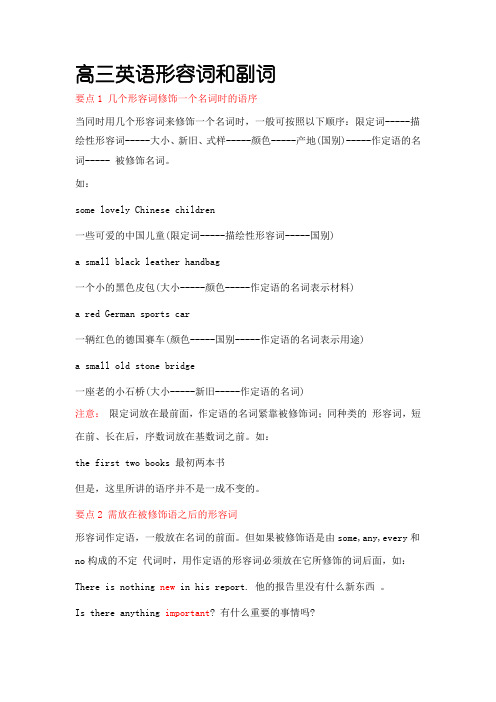
高三英语形容词和副词要点1 几个形容词修饰一个名词时的语序当同时用几个形容词来修饰一个名词时,一般可按照以下顺序:限定词-----描绘性形容词-----大小、新旧、式样-----颜色-----产地(国别)-----作定语的名词----- 被修饰名词。
如:some lovely Chinese children一些可爱的中国儿童(限定词-----描绘性形容词-----国别)a small black leather handbag一个小的黑色皮包(大小-----颜色-----作定语的名词表示材料)a red German sports car一辆红色的德国赛车(颜色-----国别-----作定语的名词表示用途)a small old stone bridge一座老的小石桥(大小-----新旧-----作定语的名词)注意:限定词放在最前面,作定语的名词紧靠被修饰词;同种类的形容词,短在前、长在后,序数词放在基数词之前。
如:the first two books 最初两本书但是,这里所讲的语序并不是一成不变的。
要点2 需放在被修饰语之后的形容词形容词作定语,一般放在名词的前面。
但如果被修饰语是由some,any,every和no构成的不定代词时,用作定语的形容词必须放在它所修饰的词后面,如: There is nothing new in his report. 他的报告里没有什么新东西。
Is there anything important? 有什么重要的事情吗?He told me something very important. 他告诉我一些很重要的事。
There is nothing wrong with him. 他没有错。
So far nobody important has visited this place. 到目前为止,还没有重要人物来这儿看过。
注意:英语中有些形容词一般只能作表语,不能放在名词前作定语,如以a-开头的形容词,afraid,asleep,alone,awake,alive。
形容词变副词的几种形式

形容词变副词的几种形式1、形容词加上前缀a-变成副词例如:前缀a+形容词loud=副词aloud前缀a+形容词live=副词alive前缀a+形容词lone=副词alone2、和形容词同形的副词例如:形容词hard(辛苦的)-副词hard(努力地)形容词close(亲密的)-副词close(靠近)形容词late(迟的,晚的)-副词late(迟,晚)形容词early(早的)-副词early(早地)3、形容词原形+ly构成的副词例如:形容词slow+ly=副词slowly形容词quick+ly=副词quickly形容词real+ly=副词really形容词recent+ly=副词recently形容词different+ly=副词differently4、辅音+y 结尾的形容词,变y为i,再加ly 例如:形容词happy-副词happily形容词heavy-副词heavily形容词easy-副词easily形容词lucky-副词luckily5、辅音+le 结尾的形容词,去e加y例如:形容词probable-副词probably形容词possible-副词possibly形容词simple-副词simply6、ue结尾的形容词,去e加ly例如:形容词true-副词truly形容词due-副词duly7、ll结尾的形容词,直接加y例如:形容词full-副词fully形容词dull-副词dully8、ic结尾的形容词,加ally例如:形容词basic-副词basically形容词scientific-副词scientifically这就是形容词变副词常见的八种途径。
英语语法--形容词与副词

英语语法一形容词与副词来源:普特英语形容词1.1什么是形容词形容词(adjective)是修饰名词表示名词属性的词,常放在它所修饰的名词之前。
如:a lovely baby 一个可爱的婴儿the beautiful picture那幅美丽的图画modern history 现代历史1.2形容词的用法形容词在句中可用作:1淀语He is a good boy他是个好孩子。
The Chinese Communist Party is a great party 中国共产党是伟大的党。
2)表语The film is both moving and instructive.这部电影很感动人,而且富有教育意义。
I am very glad to see you.见到你很高兴。
3)宾语补足语和宾语一起构成复合宾语。
如:Have you got everything ready for the journey?你行装都准备好了吗?We keep our rooms clean and tidy我们经常保持房间的整洁。
4)相当于名词某些形容词前用定冠词the,变成名词化的形容词,可在句中作主语、宾语等。
如:The young are active.青年人积极好动。
(the young作主语)The blind can learn to read with their fingertips.盲人能够用指尖学习阅读书籍。
(the blind 作主语)He has a keen sense of the new他对新鲜事物有敏锐的感觉。
(the new作宾语)[注一]上述三例中的the young =the young people,the blind the Blind people,the new the new things.[注二]在The sun rose red(旭日升起)中的形容词red和Don't marry young(不要早婚)中的形容词young都是主语补足语。
中考英语专题复习(九)形容词、副词(含练习与答案).
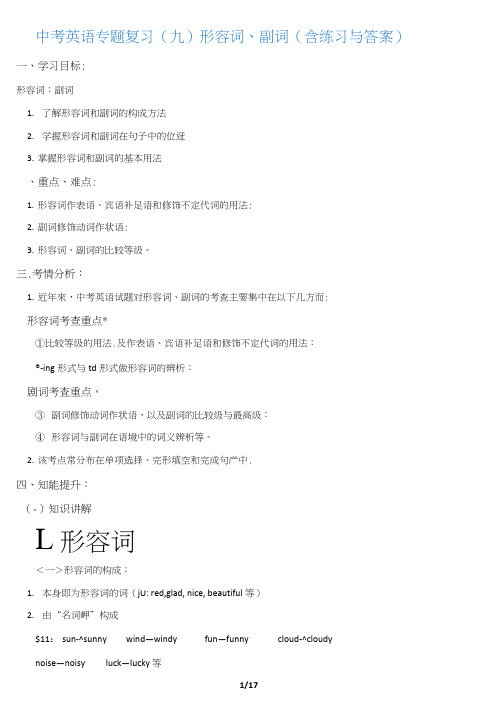
中考英语专题复习(九)形容词、副词(含练习与答案)一、学习目标:形容词:副词1.了解形容词和副词的构成方法2.学握形容词和副词在句子中的位迓3.掌握形容词和副词的基本用法、重点、难点:1.形容词作表语、宾语补足语和修饰不定代词的用法:2.副词修饰动词作状语:3.形容词、副词的比较等级。
三.考情分析:1.近年來,中考英语试题对形容词、副词的考査主要集中在以下几方而:形容词考查重点*①比较等级的用法.及作表语、宾语补足语和修饰不定代词的用法:®-ing形式与td形式做形容词的辨析:剧词考査重点,③副词修饰动词作状语,以及副词的比较级与最髙级:④形容词与副词在语境中的词义辨析等。
2.该考点常分布在单项选择、完形填空和完成句产中.四、知能提升:(-)知识讲解L形容词<一>形容词的构成:1.本身即为形容词的词(jU: red,glad, nice, beautiful等)2.由“名词岬”构成$11: sun-^sunny wind—windy fun—funny cloud-^cloudynoise—noisy luck—lucky 等3.形容词具仃独特的后缀形式主要右:-able, -ible, -al, -ical, -ant, -ary, -ful, -less, -ous 等.如:comfortable, terrible, national, natural, political, chemical, imports nt, pleasa nJ ordinary, necessary, beautiful, wonderful, careful^ hopeless, careless, famous^ dangerous 等。
4.以」y结尾的形容词如:friendly友好的:lonely孤独的:lovely可爱的:等v二〉形容词的用法及位置1.作定语形容词修饰名词时迓于名词Z前:修饰不定代词时,置于不定代词之后。
形容词和副词的比较等级
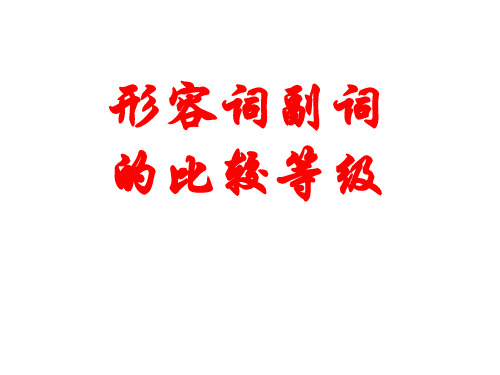
The room is three times as big as mine. = The room is _tw__ic_e__b_ig_g_e_r_t_h_a_n__ mine.
The river is five times as long as that one. = The river isfo_u_r__ti_m_e_s__lo_n_g_e_r_t_h_a_n_ that one.
某些单音节词,+more, most 构成比较级和最高级。 glad – more glad – most glad pleased – more pleased – most pleased tired – more tired – most tired often-more often- most often
any other river in China.
other +n.(复) 其他……
比较级+than + any +n.(单)
任何一个……
any other+ n. (单) 其他任何一个……
My arms are longer than yours. He is taller than I.
比较必须在同类中进行,即人与人比,物与物比。
5.the+比较级…,the+比较级… “越……,越……” The bigger,the better.
温馨提示:
当某一人/事物与其他人/事物作比较时,被比较的事物中不能包括
本身。
other rivers in China.
Changjiang is longer than any river in Japan.
那些和形容词同形的副词

那些和形容词同形的副词有些副词有两种形式:一是与形容词同形;另外一种呢,还加了一个-ly尾巴。
你知道它们的差别吗?它们或小或大,足以在考试中把你弄得晕头转向。
1. clean and cleanly副词clean完全不是“干净的”的意思,而是“径直地,完全地”意思。
The bullet went clean through his arm. 子弹完全穿过了他的胳膊。
I clean forgot about it. 我完全把这个事情忘了。
(这里也可以翻成“我把这个事情忘得干干净净了”。
看来中文和英文还是有共通之处啊!)That knife doesn’t cut clean. 那把小刀切起来不利落。
而cleanly就是“清洁地”意思啦。
The desk was cleanly filed. 桌子被整理得干干净净。
2. clear and clearly副词clear的意思和clean的意思一样,是“完全地,径直地”意思。
You see me clear. 你很透彻地看穿我。
He disappeared clear away after the crime. 他犯罪后消失得无影无踪。
clear还可以解释为“隔离,不接触”的意思。
Stand clear of the gate. 别靠近门。
You should keep clear of that stupid guy. 你应该离那个蠢家伙远一点。
当然啦,当要表达诸如“清楚地”“明显地”意思的时候,你就放心大胆地用clearly 吧。
Can you see it clearly? 你看得清楚吗?He is clearly wrong. 他明显错了。
有两个句子你要牢牢记住,clear和clearly都可以:The moon shone clearly / clear. 月光明媚。
He spoke clearly / clear and loudly / loud. 他说话清晰明朗。
- 1、下载文档前请自行甄别文档内容的完整性,平台不提供额外的编辑、内容补充、找答案等附加服务。
- 2、"仅部分预览"的文档,不可在线预览部分如存在完整性等问题,可反馈申请退款(可完整预览的文档不适用该条件!)。
- 3、如文档侵犯您的权益,请联系客服反馈,我们会尽快为您处理(人工客服工作时间:9:00-18:30)。
那些和形容词同形的副词有些副词有两种形式:一是与形容词同形;另外一种呢,还加了一个-ly尾巴。
你知道它们的差别吗?它们或小或大,足以在考试中把你弄得晕头转向。
1. clean and cleanly副词clean完全不是“干净的”的意思,而是“径直地,完全地”意思。
The bullet went clean through his arm. 子弹完全穿过了他的胳膊。
I clean forgot about it. 我完全把这个事情忘了。
(这里也可以翻成“我把这个事情忘得干干净净了”。
看来中文和英文还是有共通之处啊!)That knife doesn’t cut clean. 那把小刀切起来不利落。
而cleanly就是“清洁地”意思啦。
The desk was cleanly filed. 桌子被整理得干干净净。
2. clear and clearly副词clear的意思和clean的意思一样,是“完全地,径直地”意思。
You see me clear. 你很透彻地看穿我。
He disappeared clear away after the crime. 他犯罪后消失得无影无踪。
clear还可以解释为“隔离,不接触”的意思。
Stand clear of the gate. 别靠近门。
You should keep clear of that stupid guy. 你应该离那个蠢家伙远一点。
当然啦,当要表达诸如“清楚地”“明显地”意思的时候,你就放心大胆地用clearly 吧。
Can you see it clearly? 你看得清楚吗?He is clearly wrong. 他明显错了。
有两个句子你要牢牢记住,clear和clearly都可以:The moon shone clearly / clear. 月光明媚。
He spoke clearly / clear and loudly / loud. 他说话清晰明朗。
3. close and closely都听过莫文蔚的Close To You这首歌吧?那为什么不是Closely To You?就让我来解释一下这两个词的区别吧!副词close修饰具体的事物,表示“接近地”意思。
He lives close to the school. 他住得离学校很近。
当修饰抽象的事物,表示“接近地”、“严密地”、“仔细地”的时候,就放心大胆地用closely吧!Watch what I do closely! 仔细看我怎么做的!4. direct and directly副词direct作“直线地,不绕圈子地”解。
The train goes there direct. 火车直接开到那儿。
The next flight doesn’t go direct to Rome. 飞机不直达罗马。
He came direct to London. 他直接到了伦敦。
而directly作“直接地”的解。
Answer my question directly! 直接回答我的问题!She told me very directly and openly. 她直截了当地告诉我了。
directly还有“立即”和“马上”的意思。
I will be there directly. 我马上就到。
He should be here directly if you don’t mind waiting. 如果您不介意等等,他马上就到。
5. easy and easilyeasy作副词的时候只出现在固定搭配中。
Take it easy. 别着急,慢慢来。
Go easy. 别着急。
Easy come, easy go. 好来好散。
Stand easy! 稍息!除此之外,都用easily。
I finished it easily. 我一下子就搞定了。
He is not easily satisfied. 他不容易满足。
6. firm and firmlyfirm作副词用时,只出现在以下的固定搭配中:Stand firm. 站稳了啊。
Always hold firm to what you believe. 坚持你所信仰的东西。
7. high and highlyhigh用作副词用的时候也只出现在以下几种情况中,你牢牢记住就好!aim high力争上游hold one’s head high骄傲play high大赌注search high and low到处寻找run high激动fly high有雄心highly通常是抽象的“高”的意思。
He spoke highly of her. 他大大赞美她。
He paid highly for his stupid behaviors. 他为他做的蠢事付出了很高的代价。
8. right and rightly这两个词语当表示“对”的意思的时候都可以修饰动词,但是rightly通常放在动词之前。
你可以看看下面的句子。
He rightly guessed that you were not going there.He guessed right that you were not going there. 他猜对了,你不会去。
If I remember right, you were my high school classmate. 如果我记得没错的话,你是我的高中同学。
If I’m rightly informed, I should be there right away. 如果消息没错的话,我得马上去。
9. sharp and sharply这两个词都可当作“急剧地”意思解。
At the crossroads, we turned sharp to the left. 我们在十字路口突然来了个左转。
The road turns very sharply. 道路起伏不平。
另sharp作副词时表达“准时”或“仓猝”的意思,多半修饰时间、方向和音符;sharply 则是“刻薄”或“尖刻”的意思,多半修饰行动和说话。
The violins were playing sharp.小提琴能演奏高音。
Don’t speak too sharply to them,please.请不要对他们说话过于尖刻了。
10. slow and slowlyslow作副词用的时候仅仅能用于go slow这样的搭配。
其他情况都用slowly。
The workers decided to go slow. 工人们决定怠工一会儿。
Speak slowly, please. 拜托您说慢点儿。
Drive slowly when you are crossing the road. 过那条马路的时候开慢点儿。
练习一下下面有几道测试题,如果你还拿不到满分,那就再多看看这篇文章吧!Sorry I didn’t turn up —I _____ forgot. (clean, cleanly)I’m afraid I’m _____ out of food. (clean, cleanly)This pen writes _____ . (clean, cleanly)I can’t see _____ without my glasses. (clear, clearly)The prisoner got _____ away. (clear, clearly)Come _____ ! I want to tell you some secrets. (close, closely)She’s _____ related to my family. (close, closely)The plan goes _____ from London to Houston without stopping. (direct, directly)Let’s meet _____ after lunch; then I’ll take you _____ to your room. (direct, directly) This is a sentence _____ quoted from Latin. (direct, directly)I _____ recommend it. (high, highly)He can jump really _____. (high, highly)He’s really ambitious; he aims _____. (high, highly)I _____ assumed that Henry wasn’t coming. (right, rightly)Always hold _____ to your beliefs. (firm, firmly)Fix the post _____ in the ground. (firm, firmly)Keys:clean clean cleanly clearly clear closeclosely directly direct;directly directly highlyhigh highly rightly firm firmly。
